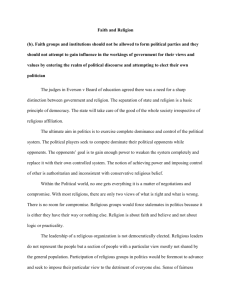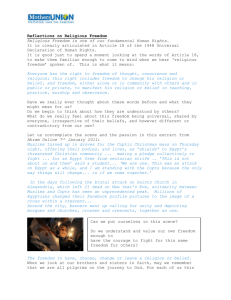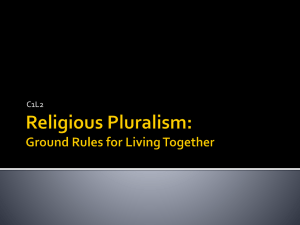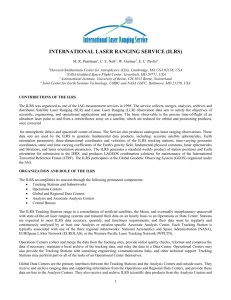ILRS Manifesto - Banning Vereniging
advertisement
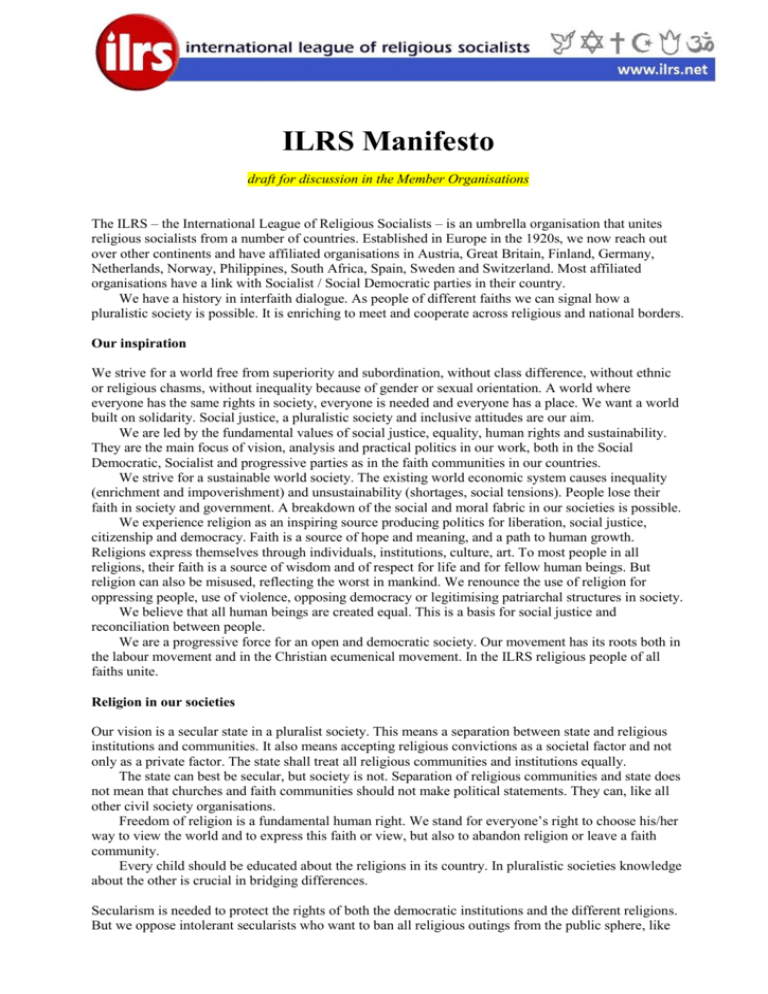
ILRS Manifesto draft for discussion in the Member Organisations The ILRS – the International League of Religious Socialists – is an umbrella organisation that unites religious socialists from a number of countries. Established in Europe in the 1920s, we now reach out over other continents and have affiliated organisations in Austria, Great Britain, Finland, Germany, Netherlands, Norway, Philippines, South Africa, Spain, Sweden and Switzerland. Most affiliated organisations have a link with Socialist / Social Democratic parties in their country. We have a history in interfaith dialogue. As people of different faiths we can signal how a pluralistic society is possible. It is enriching to meet and cooperate across religious and national borders. Our inspiration We strive for a world free from superiority and subordination, without class difference, without ethnic or religious chasms, without inequality because of gender or sexual orientation. A world where everyone has the same rights in society, everyone is needed and everyone has a place. We want a world built on solidarity. Social justice, a pluralistic society and inclusive attitudes are our aim. We are led by the fundamental values of social justice, equality, human rights and sustainability. They are the main focus of vision, analysis and practical politics in our work, both in the Social Democratic, Socialist and progressive parties as in the faith communities in our countries. We strive for a sustainable world society. The existing world economic system causes inequality (enrichment and impoverishment) and unsustainability (shortages, social tensions). People lose their faith in society and government. A breakdown of the social and moral fabric in our societies is possible. We experience religion as an inspiring source producing politics for liberation, social justice, citizenship and democracy. Faith is a source of hope and meaning, and a path to human growth. Religions express themselves through individuals, institutions, culture, art. To most people in all religions, their faith is a source of wisdom and of respect for life and for fellow human beings. But religion can also be misused, reflecting the worst in mankind. We renounce the use of religion for oppressing people, use of violence, opposing democracy or legitimising patriarchal structures in society. We believe that all human beings are created equal. This is a basis for social justice and reconciliation between people. We are a progressive force for an open and democratic society. Our movement has its roots both in the labour movement and in the Christian ecumenical movement. In the ILRS religious people of all faiths unite. Religion in our societies Our vision is a secular state in a pluralist society. This means a separation between state and religious institutions and communities. It also means accepting religious convictions as a societal factor and not only as a private factor. The state shall treat all religious communities and institutions equally. The state can best be secular, but society is not. Separation of religious communities and state does not mean that churches and faith communities should not make political statements. They can, like all other civil society organisations. Freedom of religion is a fundamental human right. We stand for everyone’s right to choose his/her way to view the world and to express this faith or view, but also to abandon religion or leave a faith community. Every child should be educated about the religions in its country. In pluralistic societies knowledge about the other is crucial in bridging differences. Secularism is needed to protect the rights of both the democratic institutions and the different religions. But we oppose intolerant secularists who want to ban all religious outings from the public sphere, like religious dress, outfit, activities, etc.. Secularism and atheism are ways to view the world, just like faiths. No one can claim the public sphere as his own. We reject the attempts of extreme secularists to demonize specific religions and we reject xenophobia. We want to contribute to a global interfaith and intercultural dialogue to fight religious or atheistic sectarianism and violent extremism. Democracy has proved to be the best framework for freedom of conscience, the exercise of faith and religious pluralism. Democracy and religion are not incompatible. Religion can be a vital partner of a democratic society, through its moral and ethical commitment, the values it upholds, its critical approach and its cultural expression. Mobilising the religious left We raise our voices where religious conservatism is growing. Especially when, with biblical rhetoric, a free market and nationalistic ideology is legitimised with a call on God. We want to make clear that such ideology is unjustly called Christian. While the religious right is limiting ethics to private life and is unwilling to change even oppressing power relations in families and societies, our ethics are to question all oppression, also oppression by the way economics work in the world. We strive for everyone’s freedom to take power over their own lives. Economical resources should be allocated so, that everyone has the opportunity to make their choices from personal and not only from economical conditions. Globalisation under a strong neo liberal wind has increased the differences in incomes, personal capitals and opportunities. There is no economic argument for having differences of such huge size. The unrestrained enrichment causes impoverishment for too many people and tensions in societies. It promotes greed instead of solidarity as the dominant standard, and leads to blowing up our financial systems and to environmental degradation and devastation. We need another economic world order, based on justice and sustainability. Damaging the environment, climate change and poverty are threatening mankind. The actual social economic system is not able to create a just and sustainable society. We need a new concept of ‘wealth’ that also includes justice, sustainability and human rights. Growth of the ‘Gross Domestic Product’ does not necessarily mean an increase of wealth. Nor that our children and fellow men elsewhere on the world will have a good future. True growth of wealth can also very well be combined with equality and sustainability. We want to bring forward our values as religious socialists in the public debate and in politics, especially in Socialist / Social Democratic parties in the countries of our member organisations. Their visions are not seldom too poor, because they are not sufficiently linked to underlying values. We will ask our politicians and parties for their values in politics. As Religious Socialists we have the potential to be a bridge between faith communities and politics. We want to contribute to contacts between faith communities and government and political parties about public issues of faith. Faith communities, churches and mosques in our countries are often well connected with the life of poor people, even more than our political parties. They have their own organisations for ‘caritas’, diaconal activities, etc.. We want to make their assessment and knowledge available for politics, by organising contacts between political parties and these faith communities. We encourage our member organisations to organise such contacts, nationally and on town level. =-=-=-=-= 2
